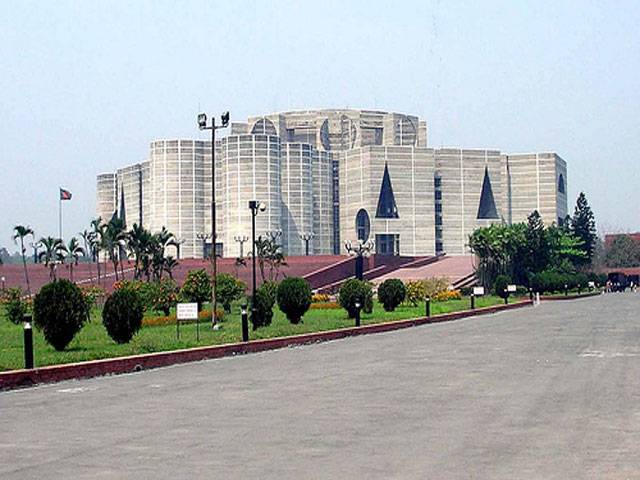DHAKA - Bangladesh's parliament Sunday amended a law to allow the prosecution of the country's largest Islamic party Jamaat-e-Islami for war crimes, in a move that could pave the way to it being banned.
News of the move was greeted by loud cheers from thousands of protesters in central Dhaka who have been demanding a ban on Jamaat, whose leaders are on trial for war crimes allegedly committed in the 1971 war.
Law minister Shafique Ahmed told AFP that under the new law "any organisation including Jamaat can be prosecuted" by a special court for war crimes and if found guilty "it can be banned" from politics.
Previously only individuals could be prosecuted for war crimes. "It's one step towards banning Jamaat," deputy law minister Qamrul Islam told AFP.
The move comes after Prime Minister Sheikh Hasina on Saturday indicated that she would back a ban on Jamaat, whose members are suspected in the murder of an anti-Islamist blogger, as it had "no right to be in politics in free Bangladesh".
Jamaat was briefly outlawed by Hasina's father Sheikh Mujibur Rahman in the 1970s for supporting Pakistan during the war. But a military government scrapped the ban after Sheikh Mujib's assassination in 1975.
Demonstrations championed by online activists have seen thousands take to the streets for the last two weeks demanding the execution of Jamaat leaders accused of genocide, murder and rape during the 1971 war and a ban on the party. "It's a partial victory for us. We won't stop protests unless Jamaat and Shibir (Jamaat's student wing) are banned," said Mahbub Rashid, a blogger and an organiser of the anti-Islamist demonstration.
Rival protests by Islamists demanding a halt to the trials of Jamaat leaders have turned violent across the country, leaving 13 people dead. Clashes between police and Islamists have intensified since last week after a senior Jamaat leader was sentenced to life imprisonment for mass murder. Jamaat and the main opposition Bangladesh Nationalist Party (BNP) have said the trials are based on bogus charges and are part of a wider political vendetta. Both Jamaat and BNP boycotted the parliament, which passed the amended law less than a week after it was approved by the cabinet. Parliament also amended war crime laws to ensure the Jamaat leaders can be swiftly executed if convicted and the verdict challenged if the sentence is less than death. It set a 60-day limit for the supreme court to dispose of appeals.
New York-based rights group Human Rights Watch this week criticised the law ahead of its passing, saying it "makes a mockery of the trial process". Late on Friday Ahmed Rajib Haider, a blogger who helped organise the anti-Islamist protests, was hacked to death with a machete near his Dhaka home.
Police have yet to comment on a possible motive, but his brother said the blogger was targeted by Jamaat's student wing for his online activities. Fellow blogger Shakil Ahmed said a veiled threat was issued against him on a pro-Jamaat blogsite. The site has since been banned by the country's telecoms regulator for "spreading hate speech and causing communal tension". Jamaat issued a statement Sunday condemning the murder and said neither it nor its student wing had anything to do with the crime.
Officials of the telecoms regulator told AFP that the Sonar Bangla blogsite had been shut down since Saturday for spreading "hate speech and causing communal tension".
"It's been closed down," vice president of the regulator Giasuddin Ahmed told AFP.
Friday, April 19, 2024
Bangladesh MPs move to ban main Islamic party

9:26 AM | April 19, 2024
US encourages Pakistan to prioritise and expand economic reforms
11:42 AM | April 19, 2024
Karachi: AVLC hands over snatched, stolen cars to owners
April 19, 2024
Bid to smuggle Siberian cranes foiled, accused held
April 19, 2024
Tajir Dost app: Traders show lack of interest in registration process
11:09 AM | April 19, 2024
A Tense Neighbourhood
April 19, 2024
Dubai Underwater
April 19, 2024
X Debate Continues
April 19, 2024
Hepatitis Challenge
April 18, 2024
IMF Predictions
April 18, 2024
Kite tragedy
April 19, 2024
Discipline dilemma
April 19, 2024
Urgent plea
April 19, 2024
Justice denied
April 18, 2024
AI dilemmas unveiled
April 18, 2024
ePaper - Nawaiwaqt
Advertisement
Nawaiwaqt Group | Copyright © 2024





